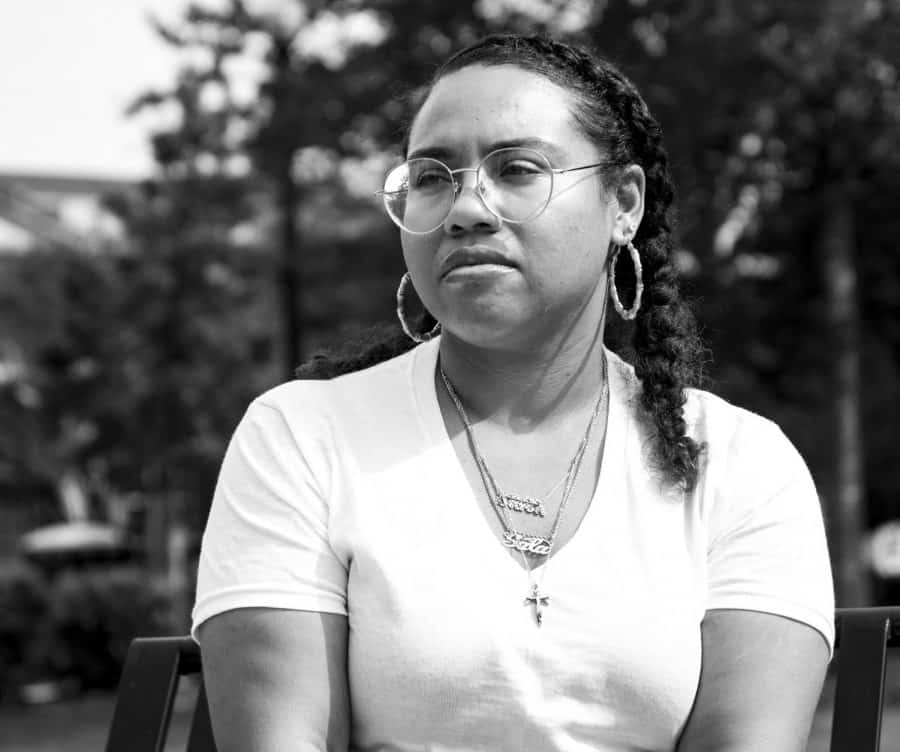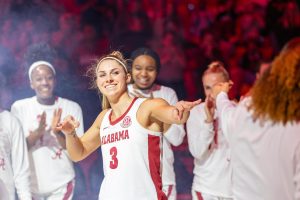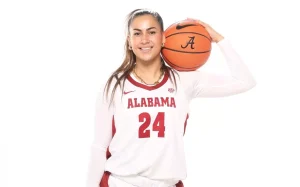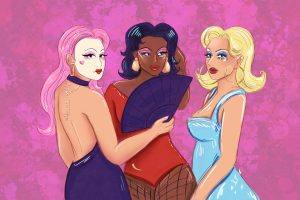The Toll it Took: How students have managed a year of grief, trauma and loss
After a year of grief and loss, healing and recovery look different for everyone.
Sala Bandele-Jackson, a senior majoring in English, said the pandemic’s toll has started to affect multiple aspects of her day-to-day life.
April 14, 2021
One year ago, the COVID-19 pandemic swept across the globe, settling over everything in its path like a dark, unmoving cloud.
Now, as the world inches further away from the shadow of a deadly pandemic, everyone in its wake is forced to confront the permanent damage it wrought.
The virus that killed nearly three million people since 2020 has sent shockwaves through American colleges. As cases at the University reached a peak of more than 2,000 in early fall, students, faculty and residents faced an incalculable toll. At least one UA student, superfan Luke Ratliff, has died from COVID-19 complications, according to The New York Times, and many others have felt tides of grief among waves of cases.
But a year ago, before the gravity of that cloud settled over the nation, many were unsure of what implications COVID-19 would have on the future.
Marlena Barrido, a UA freshman majoring in chemistry, was nearing her high school graduation when the pandemic hit.
Barrido said one day, students were told at 9 a.m. that the school would be closing for a short period of time and by 2:30 p.m., they were told the school would in fact be closed for the rest of the year.
“It was really, really shocking,” Barrido said.
Many students were both startled and confused at the onset of the pandemic, as it was initially unclear just how much would change.
“My initial reaction was that [COVID-19] would blow over in a couple weeks because that’s what everyone thought, and I wasn’t very scared in the beginning,” said Steven Alex Glidewell, a freshman majoring in psychology.
For Sala Bandele-Jackson, a senior English major, her reaction was similar. She said she didn’t take COVID-19 seriously at first. To her, “it was kind of like a joke.”
But as businesses and schools closed, stay-at-home orders were declared and mask mandates were instituted following an overwhelming number of deaths, Glidewell, Bandele-Jackson and Barrido, along with the rest of the nation, were faced with a sobering reality.
Everything they knew was about to change, starting with their education.
LIVING IN ISOLATION
“So, at first school was great. I was moving and grooving. I don’t like leaving my house, I’m a homebody. So, I was really okay with online classes; I was doing great,” Bandele-Jackson said. “[But] I will say just when I was starting to form friendships in the classroom the pandemic hit and so it was kind of a strain. I am older so it is a little more difficult for me to make connections with people at school.”
Bandele-Jackson, a Los Angeles native and transfer student, said she took the pandemic seriously and rarely left her home unless it was a necessity, but following health and safety guidelines ultimately led to other issues.
She said she started to feel isolated and alone, so much so that she began to question the validity and strength of the relationships in her life.
“It was very difficult being extremely isolated. I talked to my mom a lot and I talked to my best friend, but I cannot stress enough the loneliness I felt,” Bandele-Jackson said. “And it felt weird because everything else in my life was going so well with school, […] but in the same breath I just don’t feel great because my friendships aren’t what I thought they were.”
She said she’s never struggled in school before, but now the pandemic’s toll on her relationships and mental health have started to affect her academic performance and other parts of her life.
“I’m struggling with loneliness. I’m struggling with my parents. I’m struggling with money. I’m struggling with everything and it’s all right here in my face,” Bandele-Jackson said. “I’m genuinely burnt out.”
Bandele-Jackson said universities seem to care more about money than their students, which has contributed to the lack of help and care students feel like they’re receiving from their schools.
Many students have found it particularly difficult to manage their ongoing classes and mental health while also having to work.
Amanda Rogers, a senior majoring in English, said she’s been forced to take a job at the Tuscaloosa Walmart to pay her bills, but she feels far from safe there.
She said she wasn’t initially worried about the amount of exposure she would face there, but quickly learned the store wasn’t thoroughly enforcing the chain’s mask mandate, and that even if it tried to, customers wouldn’t abide.
Walmart could not be reached for a comment, but in a press release on March 18, 2020, found through their COVID-19 FAQ page, it said they adjusted hours to help associates stock and perform enhanced cleaning and sanitizing.
When Rogers tested positive for COVID-19, which she assumes she contracted at Walmart. She said she broke down out of concern for her elderly and immunocompromised coworkers that had been in contact with her.
“I was like, if I get anyone sick, I’m just going to die at that point because I couldn’t live with myself if I got someone else sick and they ended up doing worse than I did,” Rogers said, referring to her milder case.
Students who have had their education or stream of income disrupted and individuals who are struggling with their mental health are undoubtedly facing unprecedented challenges amidst the pandemic, but some students have experienced loss that transcends the campus or workplace.
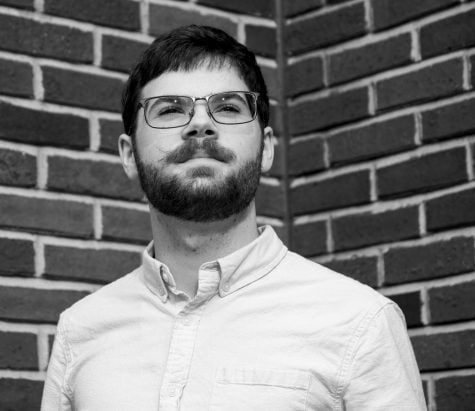
PERSONAL LOSS
Glidewell said the pandemic is still “worrying” even though vaccines are now rolling out, since he currently lives with his grandmother, whose age makes her high-risk.
Though future protection is reassuring, the vaccines have come too late for those who have already lost their lives to the coronavirus.
Glidewell has had to face that permanent impact, along with feelings of immense grief that came with losing his stepmother and father to COVID-19 over the summer.
“My mom got sick out of nowhere,” Glidewell said. “She didn’t have to wear a mask at work and then a lady came in with COVID, was not wearing a mask, and just kind of coughed in my mom’s face.”
After his mom got sick, Glidewell also got sick and lost his ability to taste and smell. Then, as soon as he regained his taste and smell, his dad lost his.
A day or two later, Glidewell said, “I woke up and he was muttering and stuff, and we had to call the ambulance.”
His father was in a coma for a month. Then, when he began to recover and finally came home, his organs failed.
After his father’s death, Glidewell said handling life as a student became difficult. He said his initial thought was to just lay in bed for an indefinite period of time, but his dad wouldn’t have wanted that, so he grabbed a soda from his fridge and went down to a friend’s dorm.
“It was really hard at first because I couldn’t share any of my achievements or my accomplishments with my father, who I’ve always been [close with], or my stepmother because she was gone,” Glidewell said. “It was hard having to go, every day, through class and stuff, doing good on some tests, and, you know, just not being able to tell [the] people I loved how I was doing.”
Glidewell recalled how his father had called him every morning and evening when he woke up from his coma. He had only gotten to see his father once while he was in the hospital before he passed.
“My dad does not get to see me be the man that he knew I would be. He won’t get to see my success or my failures. I won’t get to share those things with him,” Glidewell said.
Glidewell said a small consolation is that the bond he has with his siblings and friends has strengthened in the wake of his loss.
“It’s a double edged sword,” Glidewell said. “Like, I can’t really have my parents back, but the other people in my life that I love, you know, they’ve let me know that they’re there for me, and that they’re there to support me.”
Glidewell said he tries to manage his grief by simply taking his mind off of it in any way he can. He’s also turned to poetry since the summer, which allows him to contemplate loss and loneliness.
As summer approaches again, and many still grieve the loss of loved ones, others hunger for COVID-19 restrictions to be lifted and life to “return to normal.” But for many, normality has lost its meaning.
TRACES OF PAIN
The week before Christmas, Rogers received a phone call from her mother about her second cousins, who were brothers and both had autism.
“We got the phone call that my cousin Tommy had died in his sleep, and they didn’t know why,” Rogers said. “About 40 minutes after that phone call, we got another one that [my great-aunt and great-uncle’s] other son, Cory, was being admitted to the hospital in Huntsville because he was having trouble breathing. He tested positive for COVID, so we assumed that since Cory had COVID, that Tommy had died from complications from COVID in his sleep.”
Just a week later, two days before Christmas, Rogers’ cousin Cory McLaughlin died in the hospital.
Around the same time, Rogers’ family friend was admitted to the ICU and also died from COVID-19.
“It was just like three in a row, in the span of a week-and-a-half,” Rogers said.
Rogers said the amount of fear and loss that has resulted from the pandemic won’t be easy to forget.
“I don’t feel like this is going away any time soon, no matter who’s saying it’s going to end, it’s going to be over, I feel like there’s going to be traces of it left everywhere, like in our day-to-day lives, from now on,” Rogers said. “There’s no way that full recovery is going to happen any time soon, until we reach a generation that didn’t live in it. That’s how I feel about it.”
Other students share Rogers’ sentiment that recovery isn’t as easy as some are making it sound.
“I think it’s good that people are seeking out some form of normal, because of all that’s happened, but I think everybody still knows deep down that there won’t be normal as it was before COVID,” Glidewell said. “There will be no normal, not any true sense as normal as it was before. It’s just—there’s no way. But I think it’s good that people are seeking a ‘new normal.’ Do I think we have to be careful? Of course, I personally will still keep wearing the mask before I get my vaccine, and then after I get my vaccine until I know that everyone has gotten the vaccine, I’ll still be careful.”
Glidewell said it’s frustrating that some people question wearing masks, as if COVID-19 hasn’t drastically affected people’s lives.
He said if anything, people should be wearing masks out of respect for others.
“So, like with the pandemic, I’ve always been more concerned about getting [COVID-19] and giving it to someone else. Like that’s always been my main concern,” Bandele-Jackson said. “I don’t ever want to give it to someone else because if I get sick, and I died and that’s me and something that I have to live with, but I would hate to get it, not die, give it to someone else and they die. Like that would eat me up inside.”
She said she wouldn’t call herself a germaphobe, but with everything that has happened with COVID-19, she doesn’t see how things can go back to the way they were before.
In fact, the pandemic has exposed aspects of the world that many believe aren’t worth returning to.
INJUSTICE UNMASKED
As systemically racist and unjust practices were unmasked, against a backdrop of a discriminant virus that disproportionately affected Black and Hispanic Americans, Bandele-Jackson said the injustices that have been highlighted over the past year are, sadly, nothing that she hasn’t seen before.
“I feel like as a Black person, the things that were made clear, we’ve already seen,” Bandele-Jackon said. “At least for me, in my community, like growing up in LA, these are things we were all very aware of. Health care, being poor, not having enough money to feed your family, unemployment benefits, police brutality, all of these things are just, like—this is what I’ve lived with. This is what my parents have lived with, this is what my grandparents have lived with, like, this is something I’m very much used to.”
She said she was actually a little surprised at how many people were ignorant to even the basic realities of how the system works.
“I feel like this is how it’s always been. My mom calls me a pessimist,” she said. “I feel like I’m a realist. She’s an optimist.”
Bandele-Jackson said what has happened in the past year has been really eye-opening for non people of color.
While the Black Lives Matter movement has highlighted systemic, institutionalized racism toward Black men and women, the struggles of other marginalized groups have been exposed over the past year as well.
Barrido, who identifies as an Asian American and Pacific Islander (AAPI), said the pandemic has highlighted the oppression and violence that Asian Americans have always faced but has often gone unnoticed by others.
Barrido said the lack of Asian representation in American media plays a major role in perpetuating bias and ignorance.
“People are afraid of what they don’t know,” she said.
Barrido said white people tend to assume all Asian individuals are foreign, even Asian Americans whose families have resided in the U.S. for decades. That bias is often expressed by white people frequently asking Asian Americans where they’re “really” from.
In the year since COVID-19 was first identified in China, racist individuals have directed senseless hate and violence toward Asian Americans in both verbal and physical attacks.
On March 16, a white man killed eight people at three spas in the Atlanta area.
Six of the eight victims were Asian women.
There have also been a rising number of documented hate crimes against Asian Americans in cities across the country, including New York, Seattle and Philadelphia.
Asian American men and women have been stabbed, beaten and even set on fire.
Barrido said there’s a difficult dichotomy, because it’s refreshing that people are finally acknowledging and condemning the violence, yet it’s overwhelmingly frustrating that so much violence occurred before that could happen. At the same time, many Americans still deny what’s happening to their own neighbors.
‘A NEW NORMAL’
Even as the world tenaciously fights for both physical and mental wellbeing, and a new normal forged through purposeful change, there is one unifying belief: a belief in hope and love.
“No matter what it is, do your best to remember that people do love and support you and seek out that love and support,” Glidewell said. “There were days that I didn’t want to get up out of bed. And then I was like, ‘I can’t do this.’ I would then remember all the people that do love and support me.”



